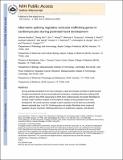Alternative splicing regulates vesicular trafficking genes in cardiomyocytes during postnatal heart development
Author(s)
Giudice, Jimena; Xia, Zheng; Scavuzzo, Marissa A.; Ward, Amanda J.; Kalsotra, Auinash; Wang, Wei; Wehrens, Xander H. T.; Cooper, Thomas A.; Burge, Christopher B; Wang, Eric T; Li, Wei; ... Show more Show less
DownloadBurge_Alternative splicing.pdf (3.553Mb)
PUBLISHER_POLICY
Publisher Policy
Article is made available in accordance with the publisher's policy and may be subject to US copyright law. Please refer to the publisher's site for terms of use.
Terms of use
Metadata
Show full item recordAbstract
During postnatal development the heart undergoes a rapid and dramatic transition to adult function through transcriptional and post-transcriptional mechanisms, including alternative splicing (AS). Here we perform deep RNA-sequencing on RNA from cardiomyocytes and cardiac fibroblasts to conduct a high-resolution analysis of transcriptome changes during postnatal mouse heart development. We reveal extensive changes in gene expression and AS that occur primarily between postnatal days 1 and 28. Cardiomyocytes and cardiac fibroblasts show reciprocal regulation of gene expression reflecting differences in proliferative capacity, cell adhesion functions and mitochondrial metabolism. We further demonstrate that AS plays a role in vesicular trafficking and membrane organization. These AS transitions are enriched among targets of two RNA-binding proteins, Celf1 and Mbnl1, which undergo developmentally regulated changes in expression. Vesicular trafficking genes affected by AS during normal development (when Celf1 is downregulated) show a reversion to neonatal splicing patterns after Celf1 re-expression in adults. Short-term Celf1 induction in adult animals results in disrupted transverse tubule organization and calcium handling. These results identify potential roles for AS in multiple aspects of postnatal heart maturation, including vesicular trafficking and intracellular membrane dynamics.
Date issued
2014-04Department
Massachusetts Institute of Technology. Department of Biology; Koch Institute for Integrative Cancer Research at MITJournal
Nature Communications
Citation
Giudice, Jimena, Zheng Xia, Eric T. Wang, Marissa A. Scavuzzo, Amanda J. Ward, Auinash Kalsotra, Wei Wang, et al. “Alternative Splicing Regulates Vesicular Trafficking Genes in Cardiomyocytes During Postnatal Heart Development.” Nature Communications 5 (April 22, 2014).
Version: Author's final manuscript
ISSN
2041-1723